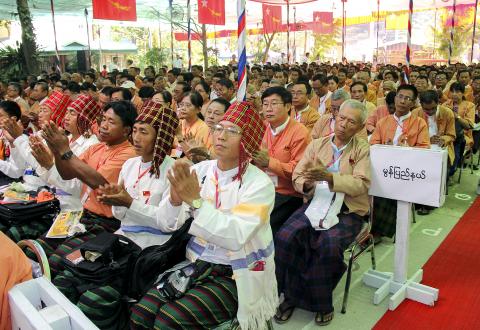Aung San Suu Kyi’s opposition party opened a historic conference yesterday seen as a key chance to revitalize the popular but inexperienced party, which faces major challenges ahead of elections in 2015.
The Nobel Peace Prize laureate’s National League for Democracy (NLD), for years banned by a junta that lived in fear of its huge public support, has been urged to enlist the help of outside experts and inject new blood into its elderly top ranks.
Propelled by Aung San Suu Kyi’s huge popularity, the NLD is widely expected to take power in the country also known as Burma if the next election is free and fair, capping a remarkable transition from military rule to democracy.

Photo: EPA
However, some experts question whether the opposition is ready for the myriad challenges of running the impoverished nation, which include building basic infrastructure, kick-starting the economy, redrawing the legal system and reviving poorly funded health and education sectors.
“It will be a litmus test for them, whether they are a party coming out of the darkness and proving they are worthy of leading this country,” said one Burmese political analyst who asked to remain anonymous.
“The NLD will need to build capacity within the organization if they become the next government. I don’t think they have anyone capable of running this show,” he added.
The NLD faces the financial and political might of Burmese President Thein Sein’s Union Solidarity and Development Party (USDP), created by former generals who shed their uniforms to run for office in controversial elections held in 2010.
The USDP, which suffered a major drubbing at the hands of the NLD in by-elections held in April last year that saw Aung San Suu Kyi elected to parliament, is also searching for a new strategy to avert a major defeat.
An estimated 850 representatives from all corners of the country are to attend the three days of talks that aim to redefine the NLD leadership — an event hailed by the party as unprecedented in the country’s troubled history.

Taiwan is gearing up to celebrate the New Year at events across the country, headlined by the annual countdown and Taipei 101 fireworks display at midnight. Many of the events are to be livesteamed online. See below for lineups and links: Taipei Taipei’s New Year’s Party 2026 is to begin at 7pm and run until 1am, with the theme “Sailing to the Future.” South Korean girl group KARA is headlining the concert at Taipei City Hall Plaza, with additional performances by Amber An (安心亞), Nick Chou (周湯豪), hip-hop trio Nine One One (玖壹壹), Bii (畢書盡), girl group Genblue (幻藍小熊) and more. The festivities are to

Auckland rang in 2026 with a downtown fireworks display launched from New Zealand’s tallest structure, Sky Tower, making it the first major city to greet the new year at a celebration dampened by rain, while crowds in Taipei braved the elements to watch Taipei 101’s display. South Pacific countries are the first to bid farewell to 2025. Clocks struck midnight in Auckland, with a population of 1.7 million, 18 hours before the famous ball was to drop in New York’s Times Square. The five-minute display involved 3,500 fireworks launched from the 240m Sky Tower. Smaller community events were canceled across New Zealand’s

‘IRRESPONSIBLE’: Beijing’s constant disruption of the ‘status quo’ in the Taiwan Strait has damaged peace, stability and security in the Indo-Pacific region, MOFA said The Presidential Office yesterday condemned China’s launch of another military drill around Taiwan, saying such actions are a “unilateral provocation” that destabilizes regional peace and stability. China should immediately stop the irresponsible and provocative actions, Presidential Office spokeswoman Karen Kuo (郭雅慧) said, after the Chinese People’s Liberation Army (PLA) yesterday announced the start of a new round of joint exercises around Taiwan by the army, navy and air force, which it said were approaching “from different directions.” Code-named “Justice Mission 2025,” the exercises would be conducted in the Taiwan Strait and in areas north, southwest, southeast and east of Taiwan

‘SLICING METHOD’: In the event of a blockade, the China Coast Guard would intercept Taiwanese ships while its navy would seek to deter foreign intervention China’s military drills around Taiwan this week signaled potential strategies to cut the nation off from energy supplies and foreign military assistance, a US think tank report said. The Chinese People’s Liberation Army (PLA) conducted what it called “Justice Mission 2025” exercises from Monday to Tuesday in five maritime zones and airspace around Taiwan, calling them a warning to “Taiwanese independence” forces. In a report released on Wednesday, the Institute for the Study of War said the exercises effectively simulated blocking shipping routes to major port cities, including Kaohsiung, Keelung and Hualien. Taiwan would be highly vulnerable under such a blockade, because it